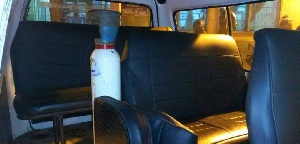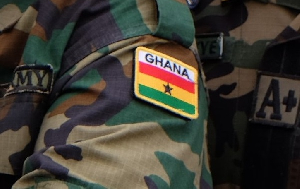 Commercial Vehicles have become alternate ambulance
Commercial Vehicles have become alternate ambulance
Taxis and Commercial Vehicles have become alternate ambulance for inter -hospital referrals of critically ill patients in the Eastern region due to lack of ambulances.
Referrals are mostly done by small clinics to the Regional Hospital, Koforidua, the Korle-Bu Teaching Hospital and 37 military Hospital both in Accra.
Oxygen cylinders are either carried or tied to a passenger seat of the Vehicle to provide basic life support and cardiovascular support for patients while connected to a hand-held drip.
Unlike ambulances fitted with paramedics apparatus such as stretcher to protect patients from further injuries during transportation, family member’s sit side by side of the patient in the commercial vehicle to hold the patient fastened to his/her seat while ensuring the oxygen mask and drip are not removed.
This inconvenient means of transporting critically ill patients for inter hospital referrals have become the order of the day by hospitals and clinics particularly in Lower Manya Krobo.
This is the only means to save lives as 17 out of the 18 overage ambulances in the region have broken down for several months.
The stations with broken down Ambulances are Koforidua, Kpong, Nkawkaw, Suhum, Kade, Kibi, Akim Oda, Mampong, Mpraeso, Nsawam ,Donkokrom, New Abirem, Anyinam, Abetifi, Asamankese and Somanya.
Reactions by some Health Officials
The Head of Administration at Atua Government Hospital, Ghattey Frimpong in an interview with Starr News said “in fact, it hasn’t been easy, but what we do on our part is that we try our best to transport them in a pick-up, we try our best to ensure that we save lives. What we do is that, we put the oxygen cylinder at the bucket of the Pick-up and tie the oxygen tube through the door to be connected to the patients.”
He said the location of the Hospital makes it a referral center for most accident cases recorded on the Akosombo Highways making ambulance medical services very crucial to the hospital.
The Administrator explained that, sometimes they have to fall on Dodowa and Volta region which are several kilometres away for Ambulance when overwhelmed by several emergency cases.
The Medical Director at St. Martins De Porres Hospital at Agormanya, Dr. Gospel Agamah also lamented that “We don’t have an ambulance, the whole municipality has no working ambulance that is how bad it is.
“Patients who are fortunate to have relatives with Private cars, we allow them to transport them during referrals which is risky but we allow them. Others pick passenger vehicles to referral hospitals.”
The Lower Manya Krobo Municipal Director of the Ghana Health Service Dr. Akosua Owusu Sarpong said the gains of the municipal health directorate is being eroded by the lack of Ambulance services.
According to her, some deaths recorded could have been saved if Emergency Medical Service delivery was available.
Ambulance Service reaction & death of a 6-year-old boy
According to the Eastern Regional Coordinator of the National Ambulance Service, Michael Gaani, they need urgent government intervention to prevent needless deaths in the region.
“A lot of calls get into the control room but we don’t have the resources to respond to them. So if we don’t have the tools, the only thing we can do sometimes if it is RTAs, we rush to the scene, try to stabilize the casualties and get them into taxis to the various facilities.
“Our control room has received over 1000 and plus emergency calls this year but those that we were able to respond to were little above 500, so what it means is that, almost 500 plus could not be attended to and your guess is as good as mine what happened to them”.
A six-year-old boy lost his life due to lack of Ambulance at St. Martin de Porres Hospital at Agomanya in the Lower Manya Krobo Municipality.
The boy identified as Adzokatse Elvis was knocked down by a motorbike and rushed to the hospital Saturday. He suffered traumatic Brain injury (internal head bleeding) hence was referred for specialized care in Accra, however, there was no Ambulance to convey the patient for emergency attention.
“The patient was involved in a motor traffic accident that happened about 4 miles away from here and the patient was rushed to this hospital, after initial assessment we realized he was having a severe head injury and needed a specialized care at the tertiary level so a call was made to 37 and Korle -Bu but finally 37 agreed to accept the patient.
We had to transport the patient to 37 Military hospital, so many calls were made from 11am and no ambulance was available, we normally get support from Dodowa but then when we called Dodowa the Ambulance was on its way to Korle -Bu, so our last resort was from Ho and at 5:15 pm patient died while the Ambulance was on its way from Ho coming,so we called the ambulance guys to get back,” Dr. Gospel Agamah explained.
The Eastern Regional Coordinator of the National Ambulance Service, Michael Gaani explained that, the Service was helpless when the distress calls came to the Control room from the hospital Authorities due to the lack of Ambulance in the region.
“The control room couldn’t provide ambulance to respond to the particular case because Somanya and Kpong which could respond to that emergency were down and as at yesterday we had just one ambulance, that is Begoro and we couldn’t dispatch Begoro to respond to that particular emergency case because it was late and the ambulance is overage.
The Eastern region, with an area of 19,323 square kilometres, occupying 8.1 percent of the total land area of Ghana and with about of 3 million population, representing 11.1 per cent of Ghana’s population, it is the third most populous region after Ashanti and Greater Accra regions.
The Regional Coordinator of NAS said the non-availability of ambulances to take care of the region is a time bomb.
Call for Passage of NAS Bill
Empirical evidence suggests Emergency Medical Services (EMS) can provide effective out -of -Hospital care in Sub-Saharan Africa to address the high morbidity and mortality connected to emergency conditions thereby meeting the Millennium Development Goals (MDGs) on Health.
The Chief Executive Officer of National Ambulance Service Prof. Ahmed Zakaria believes the passage of the NAS Bill by Parliament of Ghana would help address the current comatose condition of the Service to enable the service to provide timely, effective and professional paramedical services to Ghanaians.












